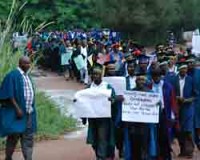
Lecturers demonstrating in southeast Nigeria against the cuts in higher education. The Academic Staff Union of Universities (AASU) has been striking in the region since July 2010., a photo by Pan-African News Wire File Photos on Flickr.
Nigeria’s education and mass failure
Written by Kekemeke Gboloibai
Nigerian Tribune
Wednesday, 14 December 2011
THE famous German Scientist, Baron Alexander Von Humboldt, had after touring South America, confided in Simon Bolivian, a Venezuela General thus: “ I believe your country is ripe for greatness, but I do not see the man who could undertake this task.”
Quite frankly, we have every reason to pride ourselves as the “Giant of Africa” or as the symbolic “gun” that would trigger the development of the whole African continent, even if such beliefs are shrouded in myths.
However, greatness does not come to any nation on the flowery bed of ease, which presupposes that for Nigeria to transit beyond these self-indulging cliches, discovering and harnessing the abundant human and natural resources for national development is a sine qua non for a better future we all envision for this country in 2020.
Incontrovertibly, in this 21st century economy that is built, driven and sustained on knowledge, the place of education in unlocking the country’s potentialities is quite intricately fundamental to our realiising the Nigeria’s development targets of 2015, as spelt out in the Millennium Development Goals (MDGs) and vision 2020.
But again, the pertinent question is: Can the present education system birth and sustain national development anchored on knowledge, ideas,innovations and moral soundness? Going by the continued mass failure recorded in examinations, the country’s education system may be in dire need of total overhauling.
The National Examinations Council’s (NECO) results released in 2009, recorded a 10.53 per cent performance of five credit passes, including English Language and Mathematics by the 1,184,907 candidates that sat for the examination. Maintaining a similar trend, the 2010 NECO results showed that out of the 1,113,177 candidates that sat for the examination, 79 per cent failed to obtain credit passes in English Language and Mathematics.
Intriguely, rather than see this trend as an approximation of the country’s educational development and conscientiously deploying performance indicators as template for reassessing the education sector, stakeholders are engaging themselves in a blame game, with examination bodies receiving the butts of legislators, ministry officials, parents and others.
This, however, is not uncharacteristic of our polity. Our capacity in the development has always been us dancing around truth, never embracing it is legendary to say the least and melodramatic at best, as the attendant reactions to the mass failure in this year’s examinations once again offers as a vista of the many bizarre contradictions that dot our polity.
A few of these shall suffice: A thriving system that throws up unprepared, gatecrashers as leaders, but who cannot apply themselves to the sacred tenets of service and sacrifice; a country that believes it is destined to rule and dominate the soccer world, but has so much institutionalised the ‘quick fix’ syndrome in the administration of football with perennial disbandment of the national team after every poor outing; and an abundance of think-tanks in every sphere of our national life, but a zero-rating on do tank apologies to Alhaji Bamanga Tukur.
This reaction is regrettably in the context of ongoing insidious practice of mass promotion in most primary and secondary Schools, and willy-nilly elevating mediocrity in the system. If results from NECO cannot ginger us up to a collective wakefulness, then, the recent ratings released by the Mo Ibrahim Foundation should be a source of concern to all and sundry.
On education, Nigeria ranked 26th of the 54 African countries, and 13th out of the 16 West African countries. And the recently released United Nations Human Development Index (HDI), which is hinged on four critical macroeconomic variables of education, literacy, life expectancy, and standard of living, ranked Nigeria 156th out of the 187 countries that were surveyed.Need we constitute a money-gurgling public inquiry to question the veracity or otherwise of this ratings?
The Ominous signs are here with us, it just takes sincerity and open-mindedness to appreciate the deteriorating state of the education sector.
The country’s education system cannot be the paradigm of a 21st century education system of international quality if the poor funding of the sector which has always been incongruous with the United Nations Education and Scientific and Cultural Organisation (UNESCO)’s 26 per cent benchmark on education funding by member countries, continues to subsist. Retrospectively, in 1999, and 2001, 16.77 per cent and 4.08 per cent of the country’s budget was appropriated for the sector, respectively, while in 2011, it is below an uninspiring 10.24 per cent.
In addtion, the needless and insipid policy reveals that what the sector had witnessed over the last decade has not produced the desired educational assets, and this has proven once again that the problem in the sector is not the absence of good policies, but rather implementation, monitoring and supervision.
Fortunately, government may have come to the realisation of this, going by the reversion to the 6-3-3-4 system of education, which was replaced last year by the 9-3-4 system, although with an addenduma of one-year early child education (1-6-3-3-4).
The collective task of building our nation, nay the education sector, can only be driven by the unalloyed commitment of all stakeholders at addressing the plethora of challenges of dearth of qualified and well-motivated teachers, funding, policy reversals, among others, that has continued to plague the system, and then assuredly, we shall begin to record good performance by students in examinations.
Gboloibai is Information Officer, NECO, Ibadan.
No comments:
Post a Comment